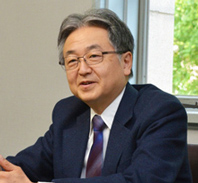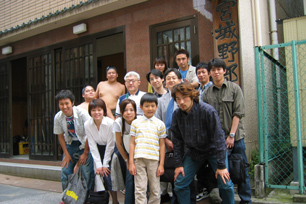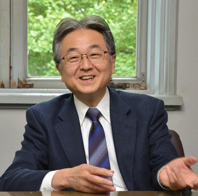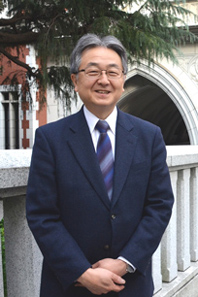Professor Takanobu Nakajima, Faculty of Business and Commerce, Understanding Economic Thinking Makes the World a Better Place
*Position titles, etc., are those at the time of publishing.
Takanobu Nakajima

Prof. Takanobu Nakajima graduated from the Faculty of Economics at Keio University in 1983, completed his doctoral course requirements at the Graduate School of Economics in 1988, and received a Ph.D. from the Graduate School of Business and Commerce. In 1988, he became an instructor at Keio’s Faculty of Business and Commerce, subsequently becoming Associate Professor, and currently Professor at the same faculty. He was a visiting fellow at the Economic Growth Center at Yale University from 1993 to 1995, and Director of the Statistics Commission Office in the Cabinet Office of Japan from 2007 to 2009. His expertise lies in productivity analysis and cost structure analysis. He is distinguished for his knowledge in sumo wrestling and also served as the Deputy Chairman of the “Independent Commission of Governance Overhaul” of the Japan Sumo Association. His numerous publications include Nihon Keizai No Seisansei Bunseki [Productivity Analysis on the Japanese Economy], Keizaigaku Dewa Ko Kangaeru [How to Think Economically], Shogaisha No Keizaigaku [Economics of Disabilities], and Oozumo No Keizaigaku [Economics of Sumo].
Examining Familiar Problems from an Economic Perspective
──What was your initial area of research in the field of economics?
In graduate school, my research focused on productivity analysis. The professor of my seminar was a specialist in econometrics, so I, too, performed data analyses using computers and mathematical methods. In other words, I used advanced mathematics to analyze various phenomena, much like empirical testing conducted in the natural sciences. I would predict outcomes and wait in excited anticipation to see if the calculations confirmed my theory. The first book I published was titled Nihon Keizai No Seisansei Bunseki [Productivity Analysis on the Japanese Economy] (2001), in which I measured and verified productivity in various sectors of the industry, including railways, property and casualty insurance, and the service sector, by devising ways to construct models and process data. In Japan, most people perceive economics as a discipline in the humanities, but such approaches and methodologies explained above are clearly scientific. In my seminar, I cover these basics of economics; and based on this knowledge, students learn how to see and consider things from an economic perspective.
──You have also published books on familiar topics and issues which are examined from an economic point of view.

During one of my classes, I tried to engage my students by discussing a favorite topic of mine, sumo. It was then that I had a flash of inspiration to write an economics book on sumo, the result of which was the Oozumo No Keizaigaku [Economics of Sumo] (2003). I tried my utmost to avoid complex formulae so that my book could be read and understood by as many people as possible. Unfortunately, the book didn’t sell very well, but it received a lot of reviews and was much talked about.
I was in my third year of junior high school when I started following sumo. From then, I began reading articles in the Oozumo magazine about how sumo stables were managed, how the stables are leaving the Ryogoku area, the wage system of the wrestlers, and so on. I believe this allowed me to translate sumo into economics. The old systems and customs in the sport have remained unchanged since the Edo Period, which has resulted in many problems in the system today—the world of sumo can be seen as a microcosm of Japanese society that faces similar problems.
──The book Shogaisha No Keizaigaku [Economics of Disabilities] (2006) also became a topic of discussion. This is not a subject one can approach lightly.
![Fieldwork conducted for the book Otera No Keizaigaku [Economics of the Temples] (2005)](/en/keio_in_depth/research/2015/cb96u900000025d1-img/cb96u900000025ku.jpg)
As my child is carrying a disability, the theme was very close to me. However, since it is also extremely personal, I purposely avoided any association with it in my work. As my child was going out into the real world, I felt that I, too, was mentally prepared to deal with this subject objectively, and decided to take it up in my work. The reaction to the book was enormous.
Most books on people with disabilities are about the experiences of the families or those connected to them, new ways of understanding disabilities, aspects of disabilities not commonly known, or critical examinations by experts of the legislative system or other systems related to disabled people; and there was a wall that held others back from haphazardly approaching the topic from a different domain. In contrast, my book was based on extensive interviews and questioned whether the welfare system for people with disabilities, to which a large amount of budget is allocated, is really benefitting them, and how we should approach their employment and their lives. These were some of the issues I tried to assess and analyze from a third-person perspective in my book. Ever since then, taking an economic perspective on certain social phenomena that are assumed to be quite unrelated to economics has become a foothold in my research.
Everything has an incentive

──What do you mean by “economic perspective?”
What I mean by “economic perspective” is looking at social phenomena through a combination of logical thinking and the idea of “incentives” that are at the source of human activities. There is an incentive for everything we do. Even spontaneous actions have incentives.
For example, the sight of young couples walking hand in hand in Shibuya is quite common. If you were to ask people why they hold hands, most would answer, “Because they like each other.” An economist may explain that they hold hands because “the incentive of wanting people to think that they make a nice couple is in play,” and also add that a married middle-aged couple do not hold hands as they do not have such incentive to do so.
──What exactly is the difference between a sociological and an economic approach?
Where economics looks at society as a whole, sociology takes one part of society and studies it in depth. In other words, economics looks at an entire society and comes up with solutions for overall optimization. Regarding people with disabilities, in addition to focusing on specific issues such as trying to allocate a larger budget or improving welfare systems, economists think about how entire societies can use limited resources efficiently. Through this process, economists come up with ideas about how best to use the resources available to people with disabilities.
One of the strengths of economics is its ability to generalize. For example, a legally mandated employment rate is enforced on companies to promote employment for people with disabilities. In order to meet this quota, companies are searching for suitable work for them, but economics looks at how to generalize the meaning of employing people with disabilities in companies. For instance, in recent years, a lot of people suffer from depression when they are assigned to a department in a company they are not comfortable with. Companies can investigate suitable employment systems or work tasks in order to help these sufferers, and to do so, there is much to learn from employment measures for people with disabilities—this is how employment of people with disabilities can be generalized. If a problem is generalized, many more people can start to relate to the problem more closely. This is how economics can contribute to society.
Opening up new fields of research after learning the basics of economics

──So you are saying that an economic perspective is beneficial to other activities outside economics?
The common perception of economics is that it is a study explaining economic fluctuations and economic indicators, but traditional culture and religion can also be subject to economic analysis. If we can change people’s perception of things, we may be able to improve society as a whole. What I want to convey is the importance of perception when we deal with topics in economics such as incentives and logical thinking, overall optimization, and generalization. Yukichi Fukuzuwa also talked about “public knowledge and public virtue,” and emphasized the importance of economics for public knowledge. He also cited a Western proverb: “ There must be a harsh government over foolish people. It is not that the government is harsh; the ignorant people have invited this misfortune upon themselves.” In other words, over foolish people there must be a harsh government, but if the people are more educated and wiser, the government would be more lenient. I believe that if a lot more people understood economic thinking, the world would be a better place. It is not about being good at making money. Having an economic perspective is key to creating a wise nation.
──Lastly, what do you wish for the students who are about to start studying economics?
I usually turn down students who ask me to become their academic advisor simply because they read my “Economics of” series. A lot of people found value in my books precisely because I had already set a solid foundation based on orthodox economics such as productivity analysis. If I had simply jumped into the subject of economics and disabilities without this foundation, my work would have received close to zero recognition. As I said earlier, if you want to study economics, you must know mathematics. I am not saying that economics is all about dealing with advanced mathematics, as there are certain fields of research in economics that are oriented to social thought and history such as economic history. But I do emphasize that students study the basics of economics and then open up new fields of research from there.
*This article appeared in "Kenkyu Saizensen" (November 26, 2014) of Keio University Japanese Website.
*Position titles, etc., are those at the time of the interview.
